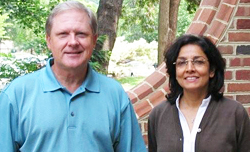The MAcc program roars into its second decade
This week, the Master of Accounting program starts its eleventh year by welcoming its biggest class ever -- 68 students - as well as the first students in the new Mason dual degree program for MBA-MAccs.
 The now customary MAcc mix of nationalities, academic backgrounds, undergraduate institutions and career goals will be greeted by two new faces. Professor Tom White has assumed the role of Assistant Dean for Accounting programs and Linda Espahbodi has stepped into the Director's role. Each brings unique strengths to the team and both are excited to continue shaping W&M's unique, nationally-ranked program.
The now customary MAcc mix of nationalities, academic backgrounds, undergraduate institutions and career goals will be greeted by two new faces. Professor Tom White has assumed the role of Assistant Dean for Accounting programs and Linda Espahbodi has stepped into the Director's role. Each brings unique strengths to the team and both are excited to continue shaping W&M's unique, nationally-ranked program.
Tom not only graduated from W&M, he came back to teach here and has served the College in roles as diverse as former Director of the MAcc and Executive MBA programs to President of the Faculty Assembly for the College.
Linda arrived in Williamsburg just two months ago after spending close to a decade with the University of Notre Dame's Master of Science in Accounting program. Under her guidance, that program achieved top-5 ranking and grew its graduating class size from 47 to 107.
"The diversity of the students here really is unusual," Linda says, "Especially in terms of the students' backgrounds and majors. This is great for all the students - it really exposes them to range of points of view."
Tom agrees, "The flexibility of the curriculum as a whole really does let students customize the program so that it works with a variety of backgrounds and interests."
Typically, Mason MAcc students follow a highly structured fall semester with a spring semester where most of the courses are electives and where classes in other programs -- MBA, Law and Public Policy for example -- can be integrated as well. Fall's emphasis on finance education - such as derivatives and fixed income - lets students pursue a wide range of classes with confidence.
But even if Miller Hall provides a spacious new setting and state-of-the-art classrooms, how will increasing the number of students affect the MAcc program's ability to deliver W&M-style classes - that is, lots of student-faculty interaction in a supportive but rigorous academic environment classes? For the better.
"Increasing the number of students, getting to a critical mass, is crucial for our ability to appeal to an even wider range of employers in this expanding market," Tom explains. While the MAcc program continues to attract a loyal following of recruiters and companies, its small size means recruiters may leave campus with some jobs unfilled. More students ultimately mean more W&M alumni working at firms across the country.
"But we are not interested in growth just for growth's sake," Tom continues. "Even if we eventually grow to a class of 90 each year, we will never relinquish our focus on providing a top-quality education for top-quality students. Our reputation as a university has always been a plus (for the MAcc program) and we have an obligation to sustain that for the College."
Linda also asserts that the program will not ever grow so large that students go unrecognized by their professors or find that they cannot shape a curriculum that meets their needs. "We still take into account the individual because we realize we are educating minds," Linda stresses. "This is not a cookie cutter program and we want to keep it that way."

